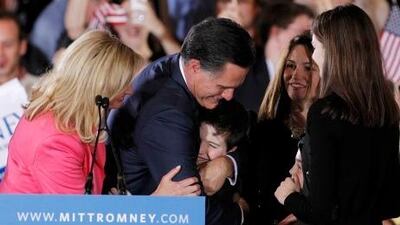WASHINGTON // Mitt Romney has secured an important victory in multiple Republican Party primary elections, but there is still little clarity in the contest to see who will challenge Barack Obama for the US presidency in November.
Ten states held primaries on so-called "Super Tuesday." At stake were a third of the number of votes needed to win the party's presidential nomination when it meets for its national convention in August.
Mr Romney, the former Massachusetts governor, won five states, including, by the narrowest of margins, Ohio, a key battleground state.
Rick Santorum, the former Pennsylvania senator and Mr Romney's closest rival, won three states, and ran Mr Romney desperately close in Ohio, where he had been leading in polls before the vote.
Newt Gingrich, the former leader of the House of Representatives, won his home state of Georgia, while Ron Paul, the Texas representative, was still hoping for a first victory, with Alaska reporting late.
Most of the focus was on Ohio, where it looked like Mr Santorum might cause an upset before Tuesday's race. The state is a key swing state that will be contested keenly in November, and no Republican has ever won the presidency without prevailing in Ohio.
On the night, Mr Romney's greater spending power eventually told. Mr Romney's campaign outspent Mr Santorum's by a four-to-one margin, according to the Wall Street Journal, and the multi-millionaire gradually hauled in Mr Santorum, who only days ago had held a double digit lead in the opinion polls in the state.
CNN called the state with 96 percent of the vote counted and Mr Romney leading Mr Santorum by just over 12,000 votes, 38 percent of the vote to Mr Santorum's 37.
In spite of the narrow margin, Mr Romney still assumed the role of nominee-in-waiting Tuesday evening, when he addressed his supporters in Boston. Mr Romney largely ignored his rivals in his remarks and focused instead his remarks on Mr Obama, as he has done for the bulk of the campaign.
"This president's run out of ideas. He's run out of excuses. And, in 2012, we're going to get him out of the White House," Mr Romney said.
For his part, Mr Santorum was keen to emphasize that he was winning states in spite of being outspent, and that he was the only realistic alternative left to Mr Romney.
""We went up against enormous odds, not just here in the state of Ohio... but in every state," Mr Santorum told supporters gathered in Steubenville, Ohio. "There wasn't a single state... where I spent more money than the people I was able to defeat. In every case we overcame the odds."
Mr Santorum has in recent weeks begun to establish himself as Mr Romney's main rival, but he is competing for the conservative vote with Mr Gingrich, who picked up the night's biggest state, his home state of Georgia.
And Mr Gingrich sounded bullish when he addressed his supporters Tuesday. He invoked the names of the many candidates that at some point during the campaign had held the mantle as Mr Romney's chief rival, from Michelle Bachman, the Minnesota representative through Donald Trump, the multi-millionaire businessman to Mr Santorum now.
"There are lots of bunny rabbits that run through," he told a boisterous crowd in Atlanta. "I am the tortoise."
With yesterday's victories – which in addition to Ohio included Idaho, Massachusetts, Virginia and Vermont – Mr Romney has now won 13 states and 359 delegates, more than his three rivals put together, according to a CNN count.
But Mr Romney needs 1,144 delegates to secure the Republican nomination. With a third of delegates now divided out, the likelihood is increasing that the four-way race could go all the way without any candidate obtaining the necessary number of delegates.
A candidate will then only be finally nominated at the Republican national convention in late August.
Mr Santorum's victories in North Dakota, Tennessee and Oklahoma, brought his tally to seven states. He has so far won 139 delegates. Mr Gingrich has 93 delegates, but could leap ahead of Mr Santorum next week after primaries in Alabama and Mississippi, both southern states in which Mr Gingrich is polling well.
Mr Paul, meanwhile, is hoping Alaska might provide him with his first victory. Mr Paul has so far secured 60 delegates.

